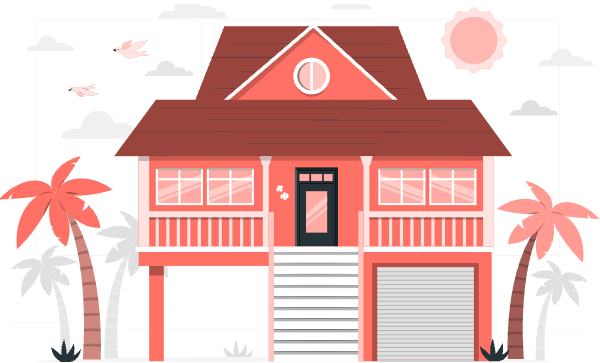Average Closing Costs in the U.S.
Buying a house is a significant investment, and it’s crucial to consider all the costs involved. One of these costs is the closing fees, which are charges paid to the lender for their loan services. To understand the specific closing costs you’ll need to pay, check out our article.

Key Takeaways: May 2023 Data
✓ Closing costs for a home purchase are usually between 3% to 6% of the loan amount. For a $200,000 home purchase, this would amount to $6,000 to $12,000. On average, the closing costs for a single-family home in the US in 2023 were $6,905. (Investopedia)
✓ Typically, sellers are responsible for paying about 8% to 10% of the home's sale price in closing costs, with the majority of this cost attributed to agent commissions. For a $300,000 home, this would equate to a closing cost of approximately $24,000 to $30,000.(Zillow)
✓ The national average closing costs for a single-family home refinance were $2,375 in 2021, not including taxes or recording fees. This reflects an $88 increase from the 2020 closing cost figures.(Lending Tree)
✓ The average closing costs for 2021, including transfer taxes, increased to $6,905.(Business Insider)
✓ In 2021, the average payment for mortgage closing costs (including transfer taxes) for a single-family property was $6,905, a 13.4% increase from the previous year. Additionally, the average purchase closing cost increased by $818 (including taxes) or $390 (excluding taxes), while the average home price in the US rose by over $50,000. (National Association of Realtors)
Section 01
Average Closing Costs for the Buyer
Section 02
Average Closing Costs for the Seller
Section 03
Average Closing Costs by State
Section 04
Average Mortgage Lender Fees
Section 05
States with Increasing and Decreasing Closing Prices
Section 06
Average Closing Fees
Section
01
Average Closing Costs for the Buyer
Closing costs are incurred by both buyers and sellers, but the majority are usually paid by the buyer. The amount of closing costs can vary depending on the type of loan, lender requirements, and government regulations.

Since 2012, the video game industry has increased exponentially and now is virtually 3x what it was in 2012. The gaming market was valued at $178.73 billion in 2022, an increase of 14.4% from 2020.
An appraisal ordered by your lender through a third-party appraisal management company determines the value of your property, sets the borrowing amount, and ensures you are not overpaying for a property, with fees typically ranging between $300 and $600.
The closing fee, which varies depending on the state and whether an attorney is required to attend, is paid to the escrow company or attorney conducting the closing meeting, with some states mandating an attorney's sign-off on every closing.
If charged by the lender, courier fees cover the cost of transporting mortgage documents, typically costing around $30.
Attorney fees are required in certain states for a housing loan closing, covering the cost of a real estate attorney who will coordinate the closing and draw up paperwork for the title transfer, with charges varying based on state and local rates.
The cost of pulling your credit report and looking at your credit score is covered by credit reporting fees, which are typically around $25.
Buying discount points, which are equal to 1% of your loan amount, allows you to pay upfront to reduce your interest rate and save interest over the loan's life.
Unlike other fees, discount points, which cost $1,000 for a $100,000 loan and $2,000 for a $200,000 loan, are optional and allow you to reduce your interest rate by paying upfront.
During the closing, it's possible that your lender will require you to deposit a certain number of months' expenses into an escrow account, typically around 2 months, but it varies depending on the lender.
At closing, those who opt for an FHA loan will be required to pay a mortgage insurance premium upfront, which is currently set at 1.75% of the base loan amount.
At closing, you'll owe an MIP of $1,750 if you're borrowing $100,000 for your home with an FHA loan.
Separate from your monthly mortgage insurance premium (MIP) payment, which varies between 0.15% to 0.75% of your loan amount, an upfront payment for MIP is required at closing.
If the property you are buying is located in or near a flood zone, you may be required to pay a flood certification fee of $15 to $25, which goes to the Federal Emergency Management Agency to help identify high-risk zones and prepare for emergencies.
Homeowners insurance protects your home from damage and is often required by mortgage lenders, with the cost typically around $35 per month for every $100,000 in home value, meaning you may need to pay for a year's worth of insurance at closing, which could cost around $840 for a $200,000 home.
Loan origination fees, which cover the cost of underwriting and processing your loan, typically amount to around 1% of the loan's value and will be listed under "Origination Charges" on your Loan Estimate along with mortgage discount points.
Lender's title insurance is distinct from owner's title insurance and could amount to as much as $875.
If the house you're buying was built before 1979, you may need to pay around $300 for a lead-based paint inspection, as lead-based paint poses a significant health risk.
Owner's title insurance is optional but provides protection in various situations. For example, if a lien is discovered 10 years later, the company will reimburse you for the policy amount. It costs around 0.5-1% of the purchase price.
In certain states and for some types of loans, a pest inspection is mandatory before closing. The cost of an average pest inspection is around $100, and it may be paid by the buyer, seller, or lender, depending on the situation.
Lender's title insurance is distinct from owner's title insurance and can cost up to $875.
Some states require a land survey before finalizing a home sale. The survey fee goes to a company that verifies property lines. The cost of a land survey is typically between $300 and $950, but it can be more for larger or more complex properties.
The cost of a title search ranges from $200 to $400, and it is typically done by a title insurance company or a real estate attorney, depending on state laws.
The underwriting fee, which verifies your loan paperwork, is paid to your lender and can cost up to $795.
If you're a first-time VA borrower and make a down payment of less than 5%, your VA funding fee will be 2.15% of your loan value. For subsequent use, it will be 3.3%.
With a 5% down payment, the VA funding fee reduces to 1.5%. If you make a 10% down payment, the fee lowers to 1.25%.
When refinancing from a different type of loan to a VA loan, the funding fee is 2.15% for first-time users and 3.3% for subsequent uses.
VA Streamlines (also known as IRRRLs) require a funding fee of 0.5%.

Section
02
Average Closing Costs for the Seller
Sellers must also pay closing costs to finalize a home sale, in addition to buyers. Let's review some typical closing costs that sellers may be responsible for.
Sellers typically cover the cost of both the buyer's and their own real estate agent commissions.
This does depend on the market you’re selling in.
The average real estate commission is typically 5-6% of the purchase price, although this can vary.
Both the buyer's agent and the seller's agent typically receive an equal share of the commission.
Closing costs for a home sale can amount to 8-10% of the final sale price, excluding any outstanding debts or liens on the property.
Sellers may sometimes cover some or all of the buyer's closing costs, which can add an additional 2-5% to the total bill.
The biggest closing cost is typically the realtor commission, which is paid by the seller and divided equally between the listing agent and the buyer's agent.
Realtor commission typically amounts to 5-6% of the home's sale price, which is split between the buyer's agent (2-3%) and the listing agent (2-3%).
The realtor commission as part of the closing costs can amount up to 6% of the final sale price.
Transfer and recording fees can amount to up to 1% of the final sale price.
The Title Insurance Fee typically ranges from 0.1% to 0.5% of the final sale price.
Escrow fees typically range from $500 to $3,000, while seller's attorney fees can cost between $800 and $1,500.
Section
03
Average Closing Costs by State
When considering the average closing costs for home purchases in the United States, some states stand out as having higher costs than others.

The states with the highest closing costs, including taxes, are Pennsylvania with an average cost of $40,634.
It is followed by the District of Columbia with an average cost of $29,888.
Delaware which has an average cost of $17,859 comes third on the list.
New York follows with an average cost of $16,849.
Maryland is fifth on the list and has an average cost of $14,721.
On the other hand, when excluding taxes from the calculation, the states with the highest average closing costs are the District of Columbia with an average cost of $6,502.
New York is second on this list as well with an average cost of $6,168.
Hawaii follows with an average cost of $5,897.
California with an average cost of $5,665 is fourth on the list.
Massachusetts with an average cost of $4,904 is the fifth on the list.
When considering the cost of closing on a home purchase in the United States, it can be useful to think of the cost as a percentage of the home's purchase price.
In this regard, the state of Delaware has the highest average closing costs at 5.4% of the home's purchase price.
Pennsylvania follows with an average of 4.3%.
Section
04
Average Mortgage Lender Fees
This section discusses the average lender fees and origination fees charged by large financial institutions, as well as the maximum allowable seller contributions towards a buyer's closing costs for different types of loans.

Based on findings from the four largest banks, the average lender fees amount to $1,387.
Lender fees have an average total cost of $1,387, according to data from the four largest banks.
When it comes to origination services, large financial institutions generally charge a flat fee of $1,000 or higher. However, Chase stands out as an exception to this trend, as it levies a lower fee of $595.
While the aforementioned lenders employ a flat fee for origination services, other lenders may choose to charge an origination fee that is a percentage of the total loan amount.
The allowable amount of the seller's contribution towards a buyer's closing costs is dependent on the type of loan and is restricted by the lender.
If the buyer intends to occupy the home and the loan is conventional, the maximum amount that sellers can contribute is either 3% of the sale price or the appraised value of the property.
The aforementioned rule applies if the buyer provides a down payment of less than 10%.
In the case where the buyer provides a down payment of between 10% and 25%, the seller can contribute up to 6% towards the buyer's closing costs.
If the buyer provides a down payment of more than 25%, the maximum amount that sellers can contribute towards the buyer's closing costs increases to 9%.
For an investment property, regardless of the down payment amount, the maximum allowable contribution by the seller towards the buyer's closing costs is 2%.
Under an FHA loan, the maximum amount that sellers can contribute towards the buyer's closing costs is up to 6% of the sales price.
USDA loans permit sellers to contribute towards the buyer's closing costs, up to 6% of the sales price.
Sellers are permitted to contribute up to 4% of the home loan amount towards the closing costs for a VA loan.
Section
05
States with Increasing and Decreasing Closing Prices
This section discusses the increase and decrease in closing costs as a percentage of the total sales price in various US states.

Closing costs in 10 US states have increased over the past year, with Delaware experiencing the largest jump of 25% year-over-year.
This resulted in a rise in the total fees, as a percentage of the sale price, from 4.7% in 2019 to 5.9% in 2020.
New Hampshire followed in second place, with a 12.3% increase in closing costs.
Washington, D.C. also made the top 10 list, with a more modest increase of 3.2%.
The reasons behind these increases vary by state, but could be attributed to factors such as rising home prices, higher taxes and fees, and increased demand for real estate services.
The top 10 states where closing costs decreased are worth noting.
Missouri experienced the largest drop in closing costs, with the cost as a percentage of the total sales price decreasing from 1.02% in 2019 to 0.71% in 2020.
In Washington, the decrease in closing costs was 17.1%, making it a distant second.
Vermont and South Carolina made it to the list as well, with respective decreases of 15.6% and 14.4%.
It is important to keep in mind these variations and trends when considering buying or selling a property in these states.
Missouri saw a 30.6% decrease in closing costs as a percentage of the total sales price from 2019 to 2020.
Washington experienced a 17.1% drop in closing costs, while Vermont had a decrease of 15.6% and South Carolina had a 14.4% decrease.
Connecticut had a 14.1% decrease, followed by Pennsylvania with a 13.7% decrease and North Carolina with an 11.7% decrease.
Alabama and Oklahoma both had an 11.1% decrease, and Georgia had an 11% decrease.
In contrast, Delaware had a 25% increase in closing costs from 2019 to 2020, with New Hampshire following closely behind with a 12.3% increase.
New Jersey had a 12.2% increase, while Florida had an 11.9% increase.
Wisconsin had an 8.6% increase in closing costs, and Massachusetts had an 8.4% increase.
Nebraska and Louisiana both had increases of 8.3% and 6.9%, respectively,
Illinois had a 6.8% increase.
Finally, the District of Columbia had a more modest increase of 3.2%.

Section
06
Average Closing Fees
When purchasing a home, there are numerous fees to consider beyond the sale price. This section outlines the different fees involved in a home purchase, including appraisal, inspection, title search, credit report, origination, application, underwriting, mortgage points, documentation, processing, courier, notary, and recording fees.
Appraisal fee covers determining the home's worth, averaging $352 for single-family homes, but larger homes may cost more.
The home inspection fee covers the cost of a professional inspecting the home's condition, and typically costs a few hundred dollars.
The title search is a fee paid to a title company to search property records and ensure there are no title issues like tax liens. It costs around $300 and is typically required unless you're buying a brand-new home.
Lenders need borrowers to have title insurance for ownership issues after sale. This covers the lender and typically costs 0.50-1% of the mortgage amount. You may also purchase your own policy for additional cost to safeguard your financial interest.
The fee for a credit report is charged by the lender to check the borrower's credit report and score, and typically costs $25 or more per borrower.
Origination fee is a fee charged by lenders for creating a loan, typically ranging from 0.5% to 1% or more of the amount borrowed. It is how lenders earn their profit from the loan.
Processing a loan application may come with an application fee, which can cost several hundred dollars depending on the lender.
The underwriting fee may be a fixed amount or calculated as a percentage of the loan, such as 0.5% of the borrowing amount.
Mortgage points can be paid to lower interest rates on mortgages, offered by many lenders, which can increase closing costs but reduce long-term interest payments.
Documentation fees are charged to cover the costs of processing information and creating official records by various institutions during a financed home purchase.
Banks charge a processing fee of typically $25 to $100 to handle your loan documentation.
The courier fee, which typically costs around $20 per trip, enables lenders to quickly send your loan documents to required parties.
The notary fee is charged per signature to make it official, typically around $100 for closing paperwork, and may include additional fees for travel expenses.
The recording fee, which is around $50, is paid by the lender to the county to create a public record of the transaction.